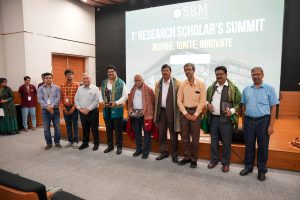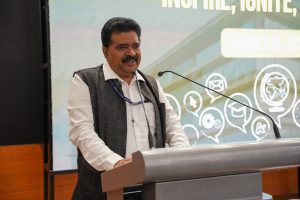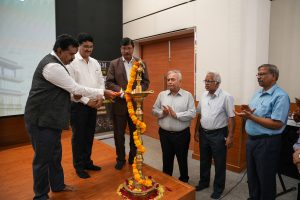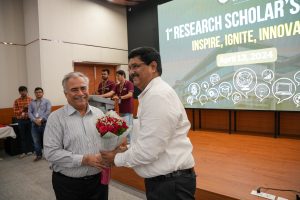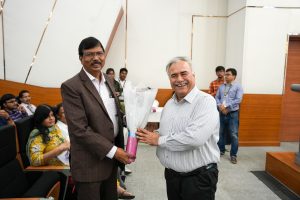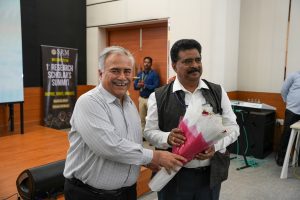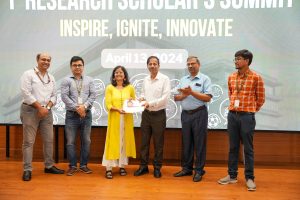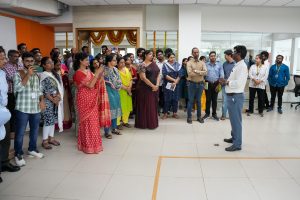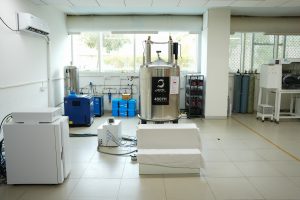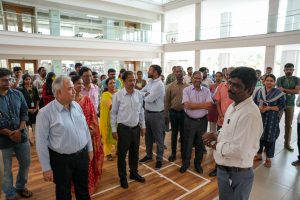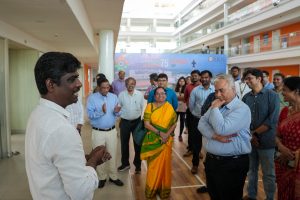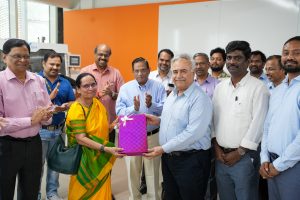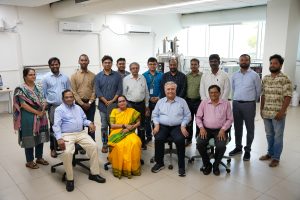All Management News
- 1st Research Scholar’s Summit: A Symposium of Ideas and Innovation April 15, 2024
“The very idea of a platform such as this is to promote multidisciplinary collaborative research,” emphasised Prof. K Hemachandra Reddy, Chairman, Andhra Pradesh State Council of Higher Education (APSCHE), encapsulating the spirit of the 1st Research Scholar’s Summit hosted at SRM University-AP in partnership with the Government of Andhra Pradesh. The event was staged to reinforce research within academic circles and herald a new phase of learning. The summit was attended by esteemed dignitaries like Prof. Korukonda Babji, Vice Chancellor Dr Y S R University of Health Sciences; Prof. Ramesh Srikonda, Director-School of Planning and Architecture; Dr M Balakrishnan, IIT, Delhi, along with Vice Chancellor, Prof. Manoj K Arora; Registrar, Dr R Premkumar, Deans, Faculty, and Students.
In his keynote address, Vice Chancellor Prof. Arora emphasised the pivotal role of such summits in fostering a conducive environment. He stated, “We live in a world of collaborations, and a summit like this gives an opportunity to interact, establish partnerships and forge scholarly excellence”. He highlighted the varsity’s research acumen in the form of patents, technology transfers, research publications, start-ups, and incubations. He also declared that the varsity would be open to sharing its state-of-the-art research infrastructure among the broader demography in order to foster a research mindset among all.
Prof. Ranjit Thapa, Dean-Research at the university, highlighted the participation of 150 PhD scholars from diverse institutions. His speech reflected the tireless commitment to building the university’s scientific fortitude. Prof. Srikonda underscored the significance of technological advancement and innovation. He praised the summit for being a stage that will offer pragmatic solutions to societal challenges and commended its tagline – “Inspire, Ignite, Innovate,” for aligning with its core objectives.
Prof. Korukonda Babji and Prof. M Balakrishnan, pivotal figures in academia, articulated the transformative role of cutting-edge research in elevating society. They emphasised the potential of such forums in catalysing groundbreaking changes in research.
The summit showcased presentations from doctoral scholars, encompassing 60 poster presentations and 90 oral presentations, organised across 8 thematic areas. The summit concluded with a valedictory function, and tokens of appreciation were presented to the dignitaries by the Vice Chancellor, Registrar, Deans, and convenors, Dr Ramanjaneya Reddy and Dr Sabyasachi Chakrabortty, and members of the organising committee.
Continue reading → - Revolutionising Energy Harvesting: Dr Banee Banadana Receives Patent for Innovative System April 15, 2024
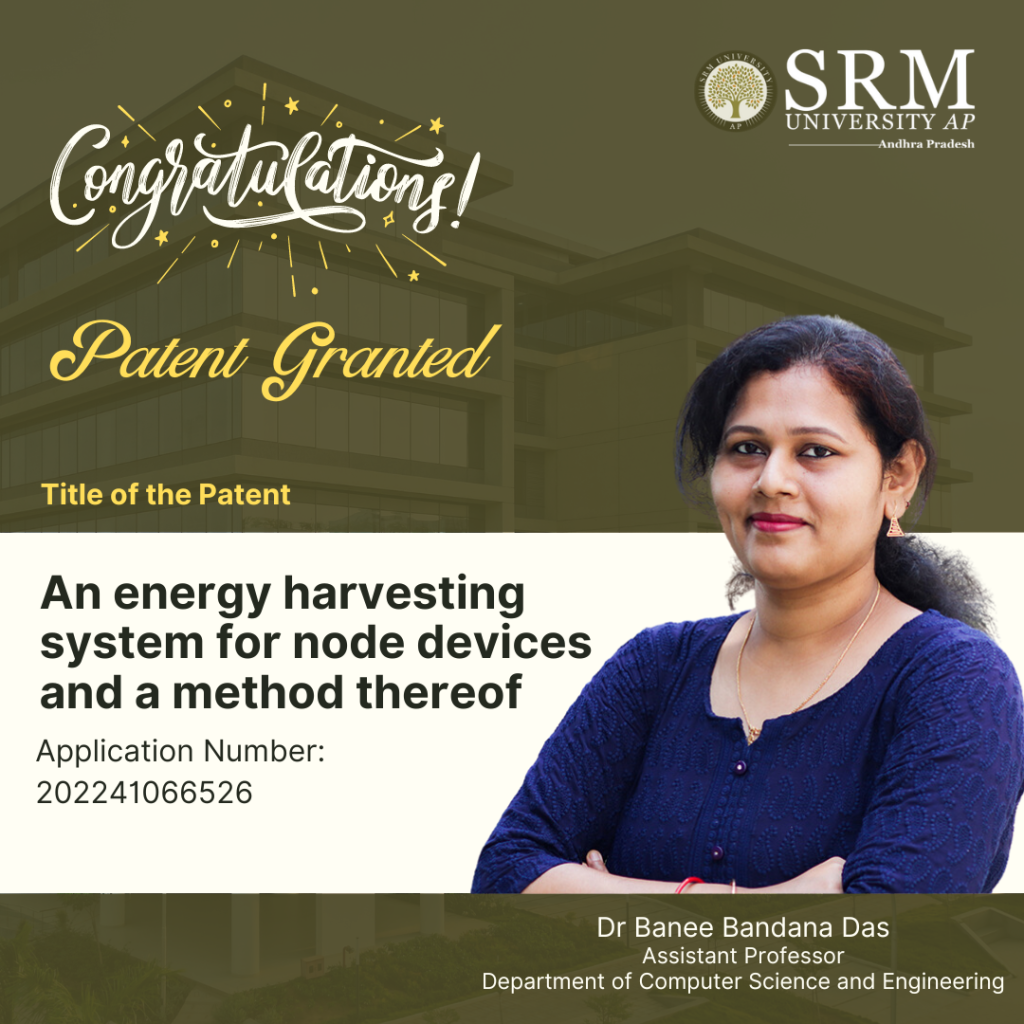
Dr Banee Bandana Das, Assistant Professor in the Department of Computer Science and Engineering, has achieved a remarkable milestone. The invention titled “An Energy Harvesting System for Node Devices and a Method Thereof” has been granted a patent by the Patent Office Journal, under Application Number: 202241066526. This achievement marks a significant leap forward in the realm of energy harvesting systems, promising a brighter and more secure future for IoT applications.
Abstract
The present invention is broadly related to design of secure and Trojan Resilient energy harvesting system (EHS) for IoT end node devices. The objective is to develop a state-of-the-art energy harvesting system which can supply uninterrupted power to the sensors used in IoT. The EHS is self-sustainable. The higher bias voltages are generated on chip. The system is mainly consisting of security module, power conditioning module, Trojan Resilient module, and load controller module. The power failure of the sensors used in IoT may leads to information loss thereby causing catastrophic situations. An uninterrupted power supply is a must for smooth functioning of the devices in IoT. This invention caters secure power requirements with security issues of IoT end node devices.
Practical Implementation:
The IoT end node devices needs 24*7 power supply and are very sensitive to attacks made by adversaries before and after fabrication. This invention takes care of the power requirement of end node devices with green energy and secure the EHS-IC from adversaries and attacks and therefore can be used by individuals, as powering sensors at remote locations and as part of smart agriculture.
Future research plans:
Design more secure and reliable design for making a IoT smart node smarter and self-Sustainable. Exploring more circuit level techniques and find new way to design more power efficient designs.
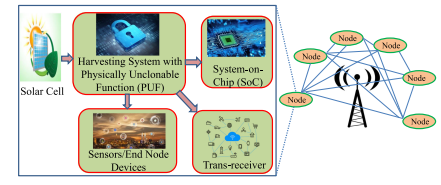
Continue reading → - 1st Research Scholar’s Summit at SRM University-AP A Symposium of Ideas and Innovation April 15, 2024
The Hindu
Continue reading →
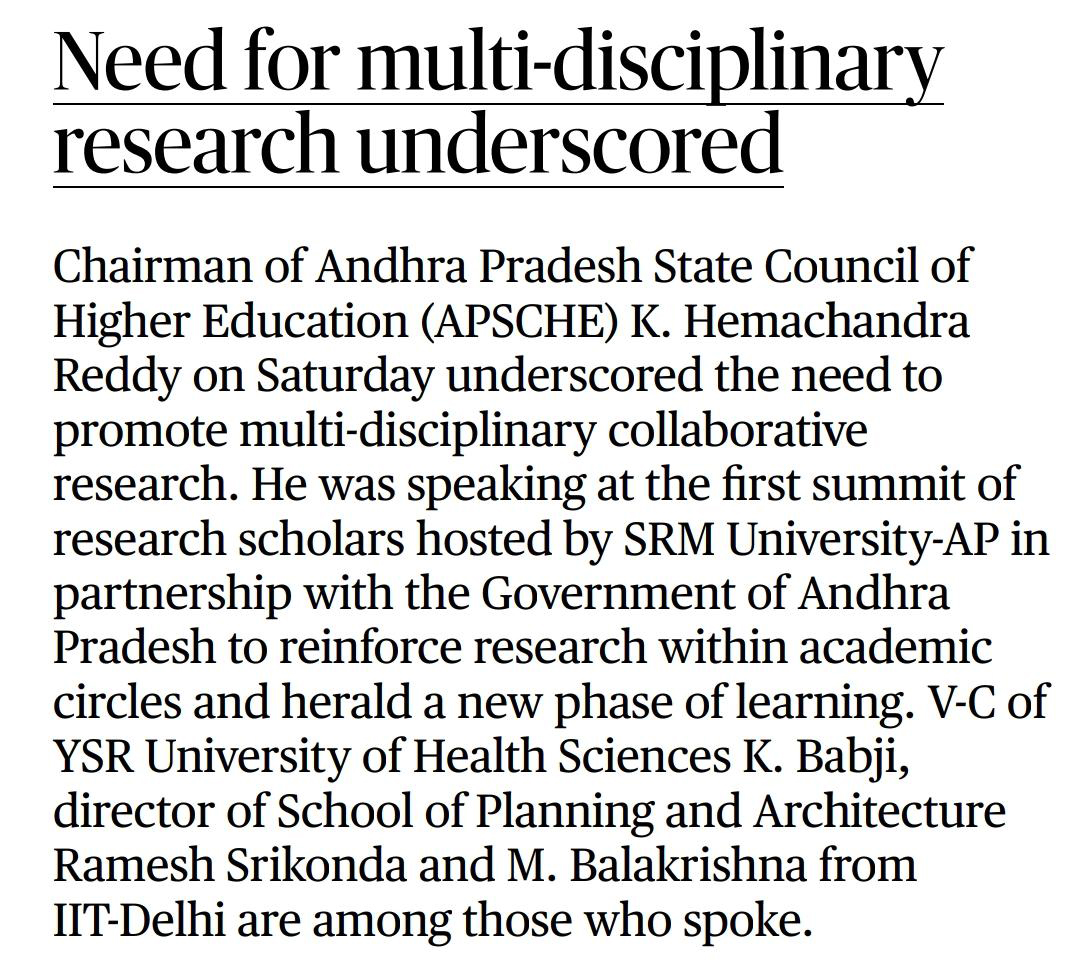
The New Indian Express
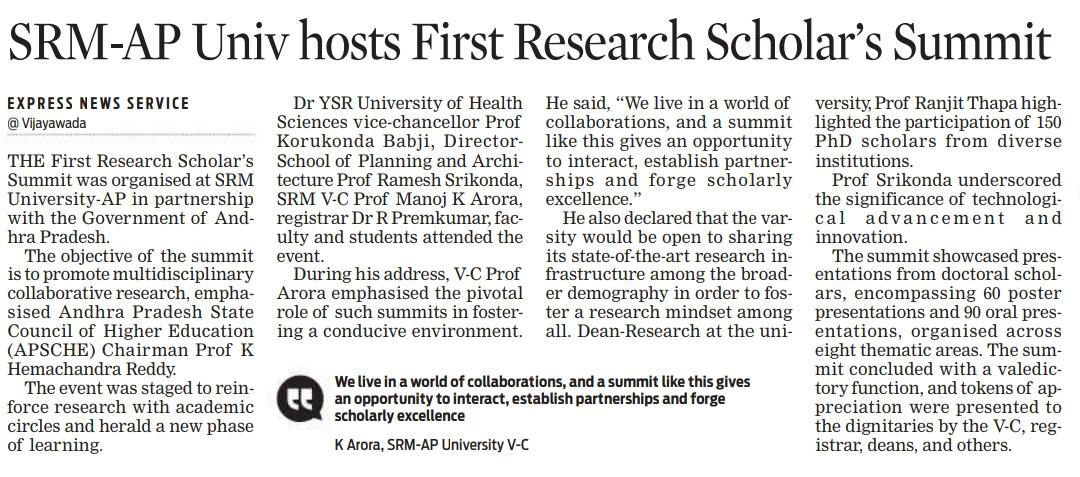
The Hans India
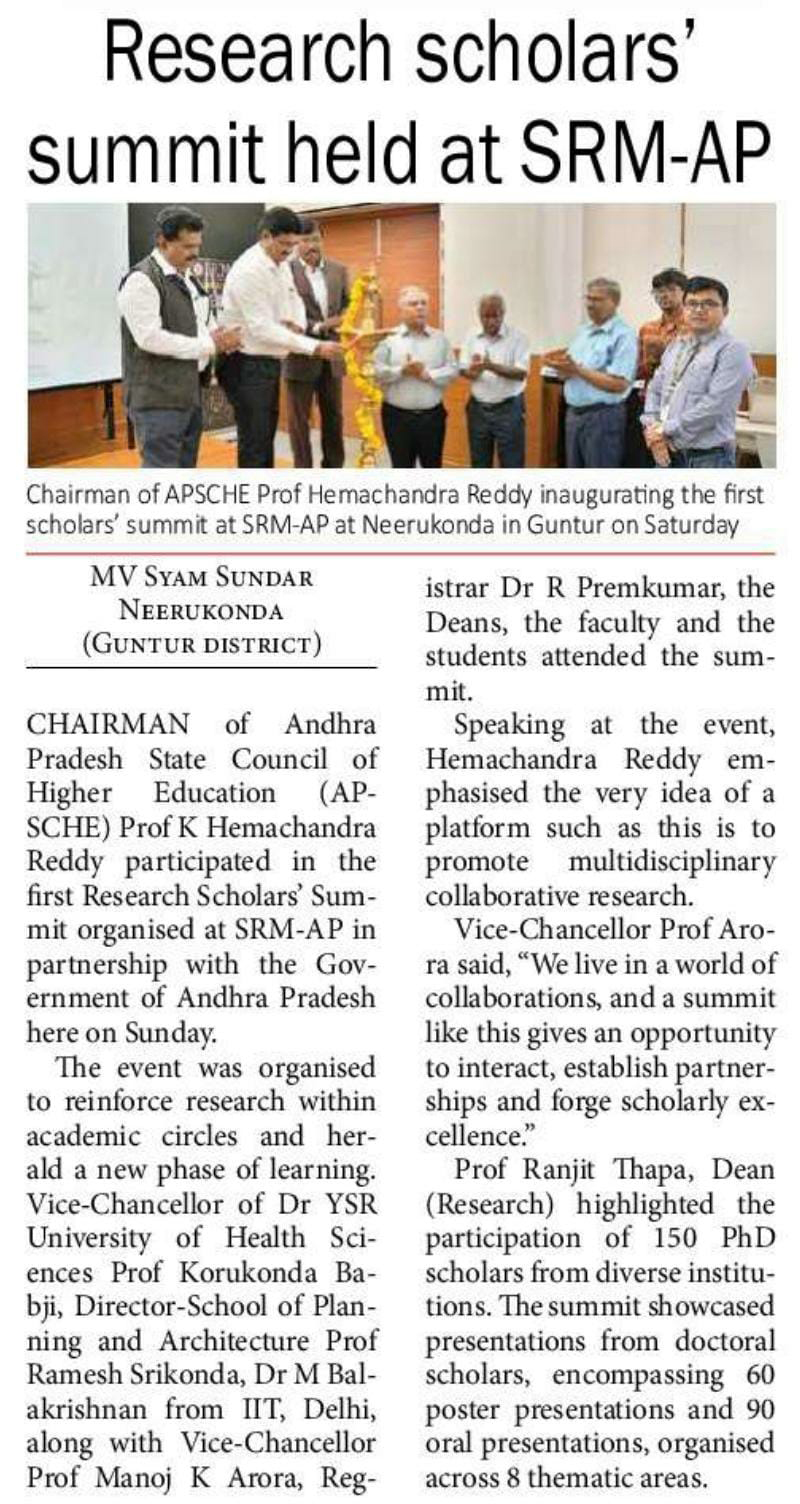
Andhra Jyothi
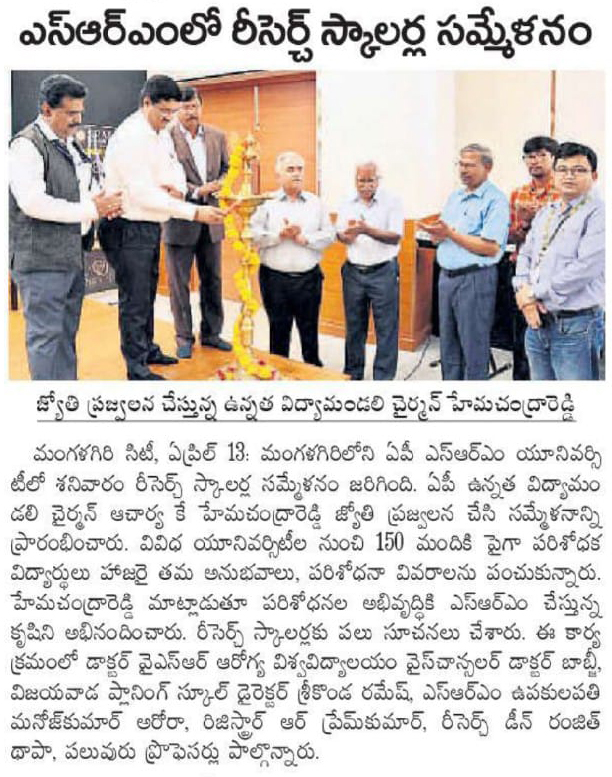
Andhra Patrika
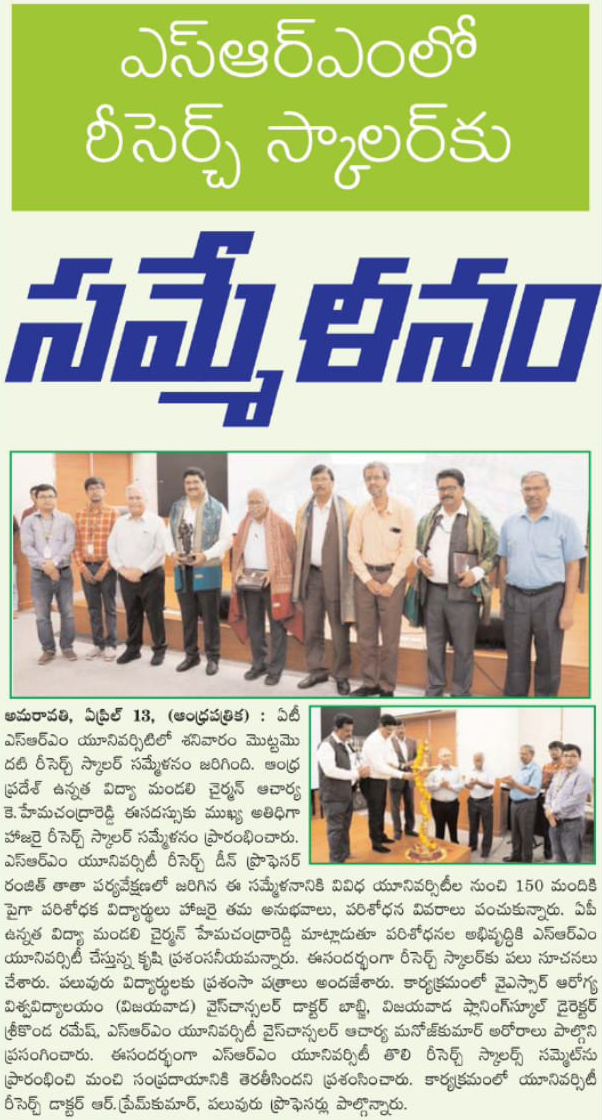
Eenadu

Visalaandhra
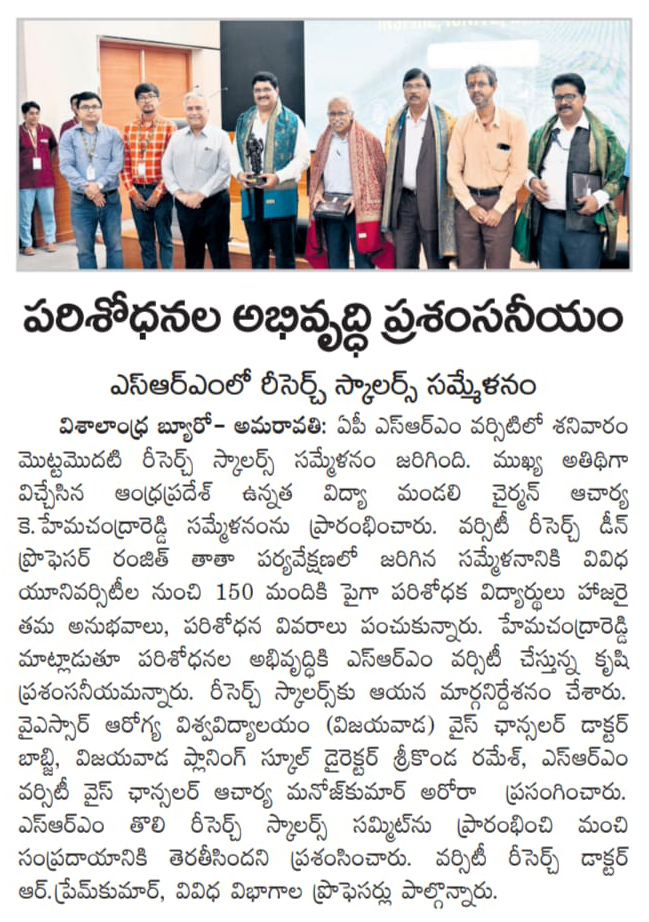
- Inauguration of NMR Spectrometer Marks a Milestone in SRM University-AP’s Research Capabilities April 15, 2024
The Hindu
Continue reading →

The Hans India
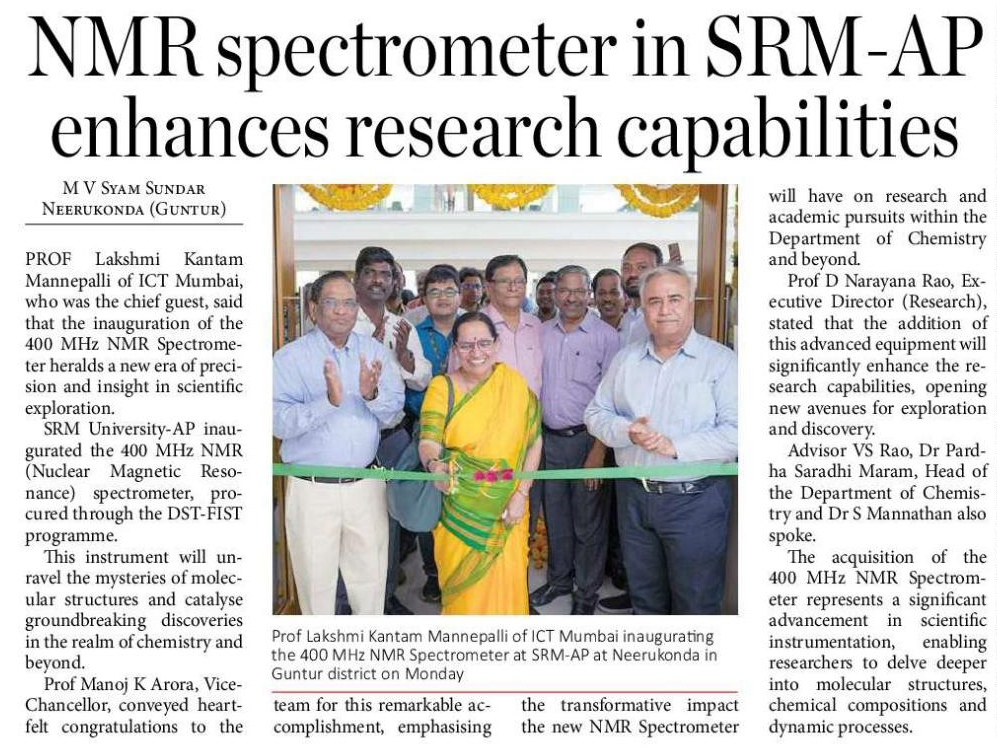
The Pioneer
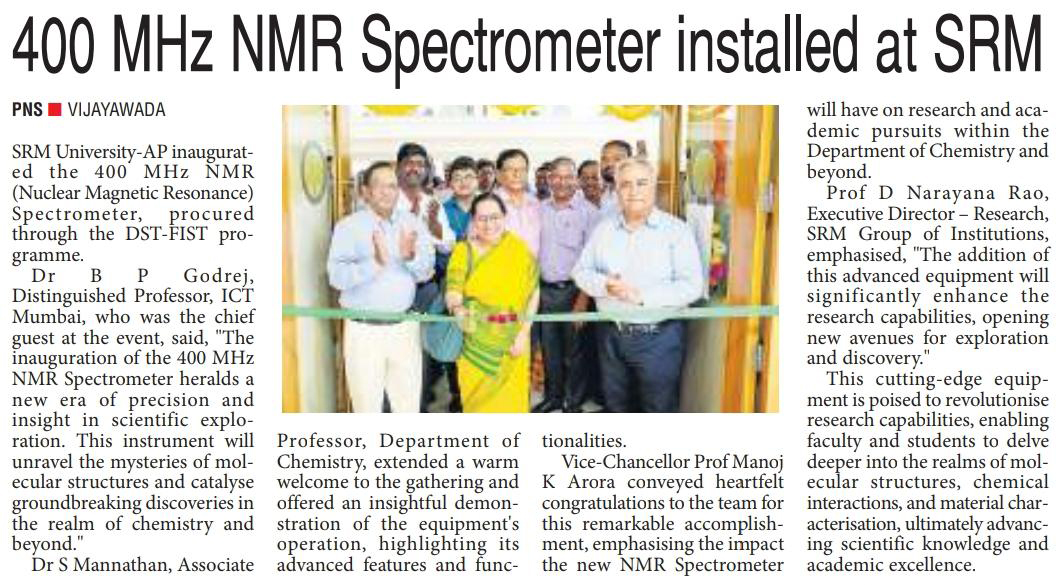
The New Indian Express
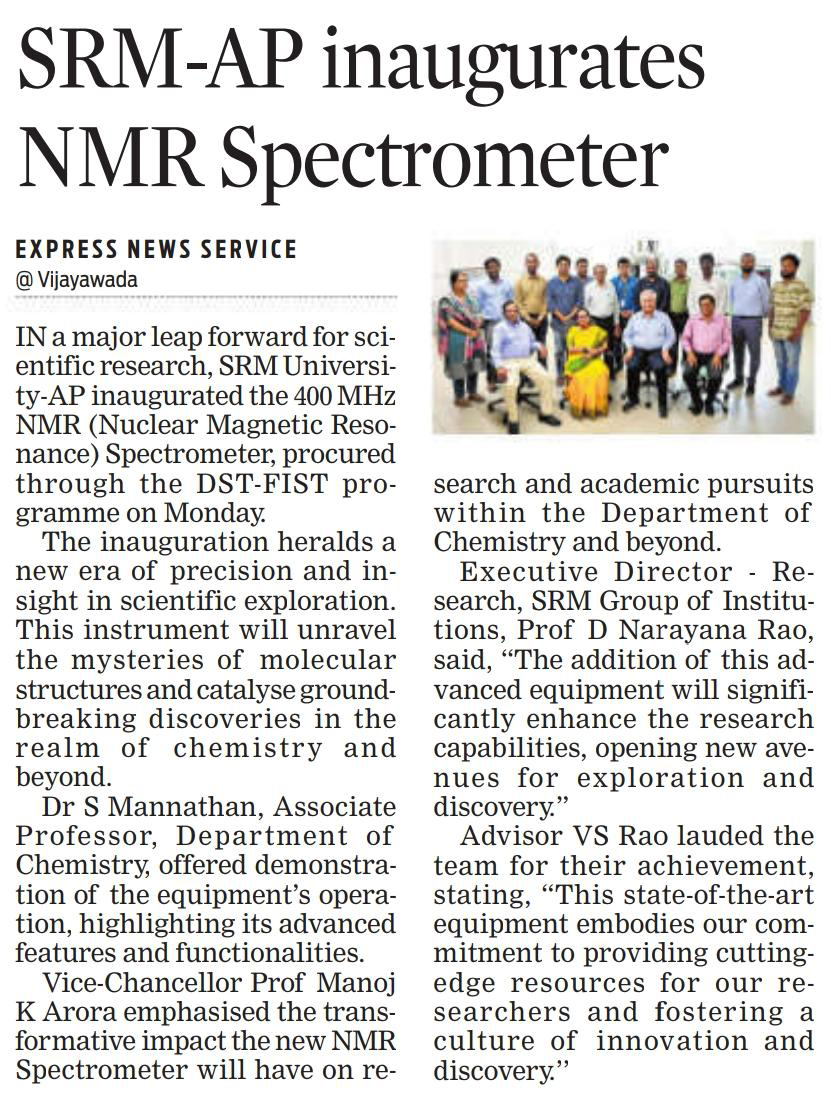
Andhra Jyoti
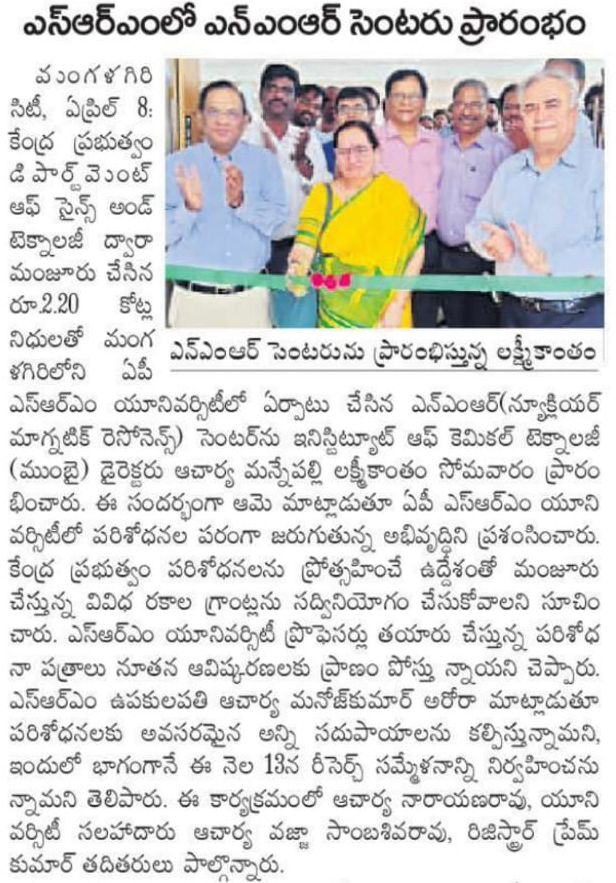
Andhra Patrika
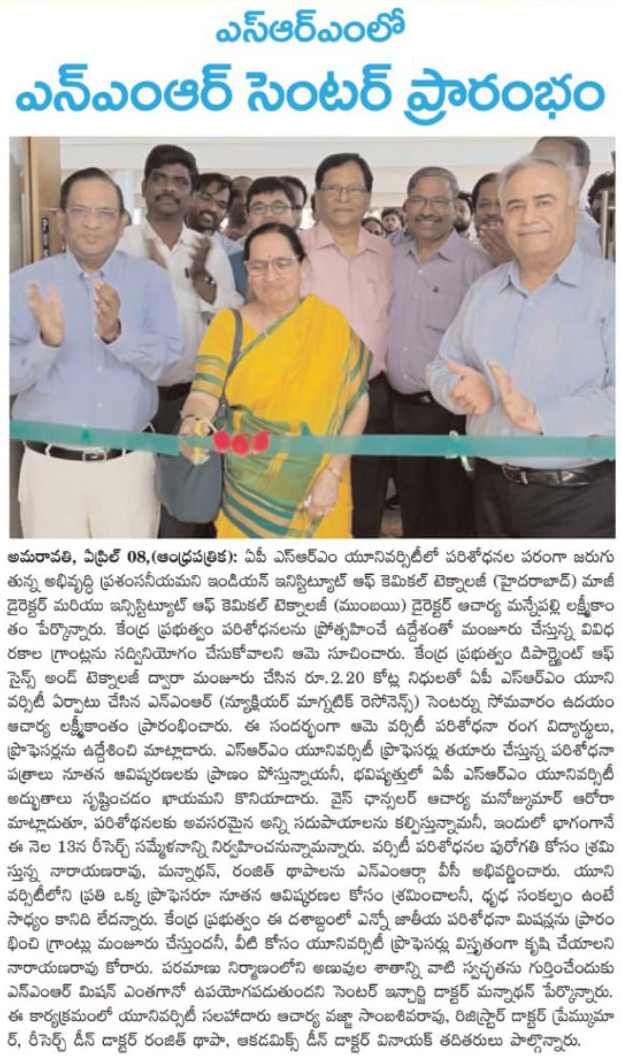
Vartha
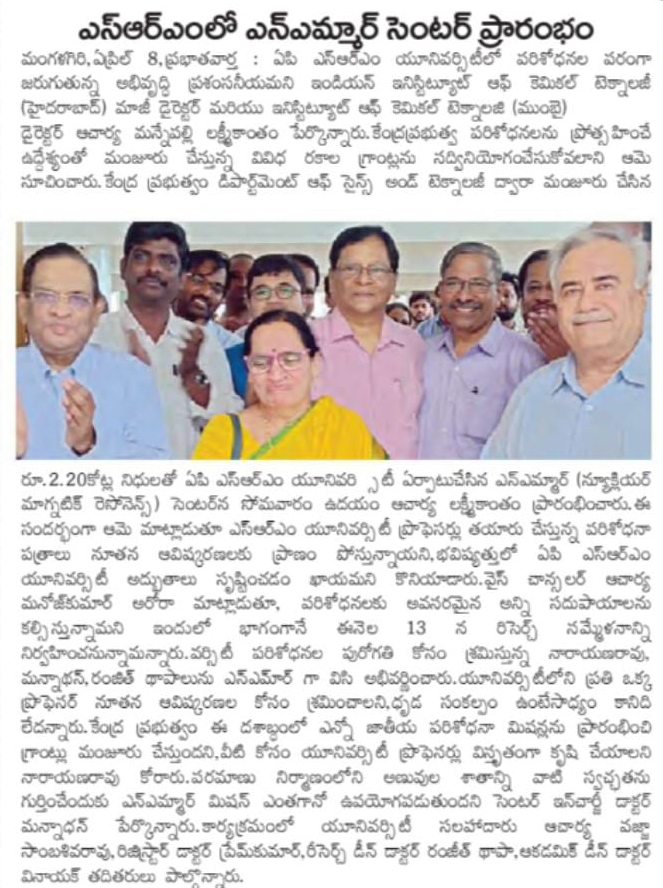
Vasalaandhra
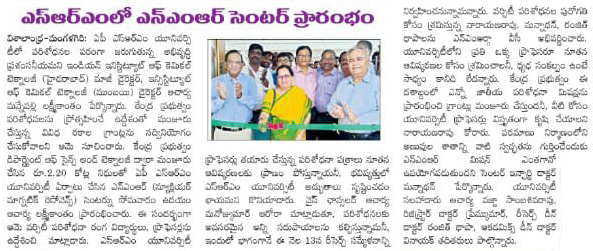
Prajasakthi
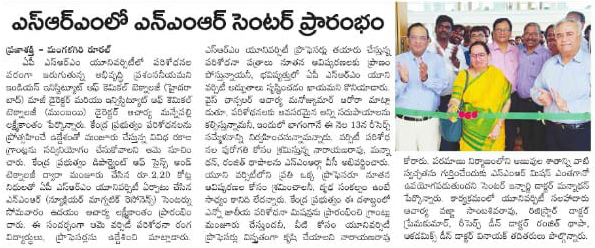
Surya
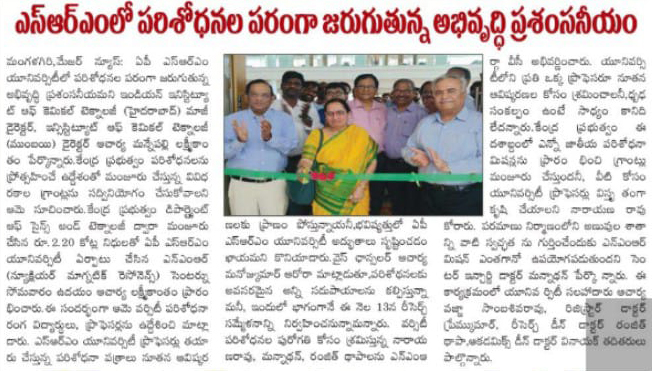
- April 15, 2024
Dr Banee Bandana Das, Assistant Professor in the Department of Computer Science and Engineering, has achieved a remarkable milestone. The invention titled “An Energy Harvesting System for Node Devices and a Method Thereof” has been granted a patent by the Patent Office Journal, under Application Number: 202241066526. This achievement marks a significant leap forward in the realm of energy harvesting systems, promising a brighter and more secure future for IoT applications.
Abstract
The present invention is broadly related to design of secure and Trojan Resilient energy harvesting system (EHS) for IoT end node devices. The objective is to develop a state-of-the-art energy harvesting system which can supply uninterrupted power to the sensors used in IoT. The EHS is self-sustainable. The higher bias voltages are generated on chip. The system is mainly consisting of security module, power conditioning module, Trojan Resilient module, and load controller module. The power failure of the sensors used in IoT may leads to information loss thereby causing catastrophic situations. An uninterrupted power supply is a must for smooth functioning of the devices in IoT. This invention caters secure power requirements with security issues of IoT end node devices.
Practical Implementation:
The IoT end node devices needs 24*7 power supply and are very sensitive to attacks made by adversaries before and after fabrication. This invention takes care of the power requirement of end node devices with green energy and secure the EHS-IC from adversaries and attacks and therefore can be used by individuals, as powering sensors at remote locations and as part of smart agriculture.
Future research plans:
Design more secure and reliable design for making an IoT smart node smarter and self-Sustainable. Exploring more circuit level techniques and find new way to design more power efficient designs.
Continue reading → - Stanford University Professor Highlights Liberal Arts Education in India at SRM University-AP April 15, 2024
The Hans India
Continue reading →
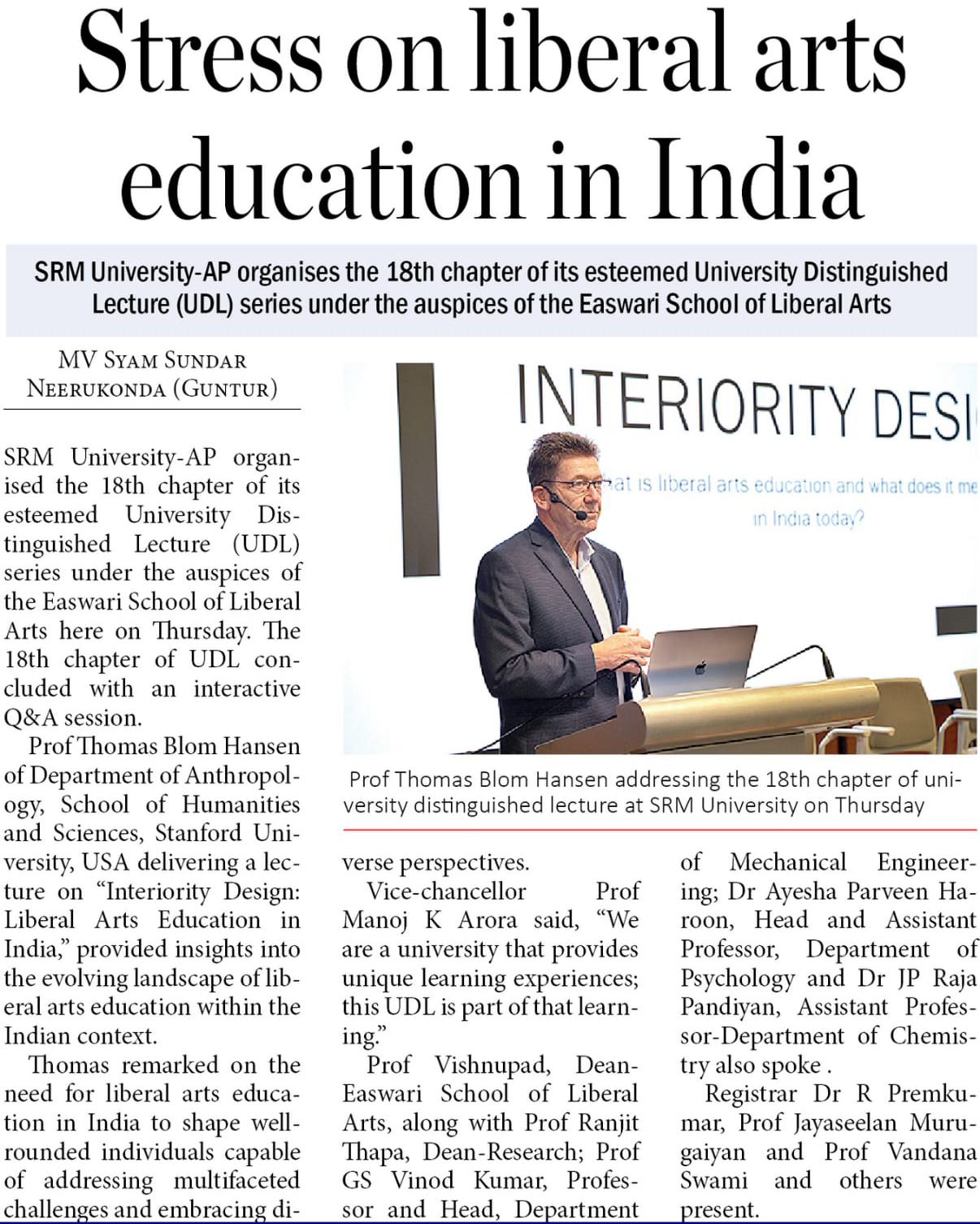
The New Indian Express
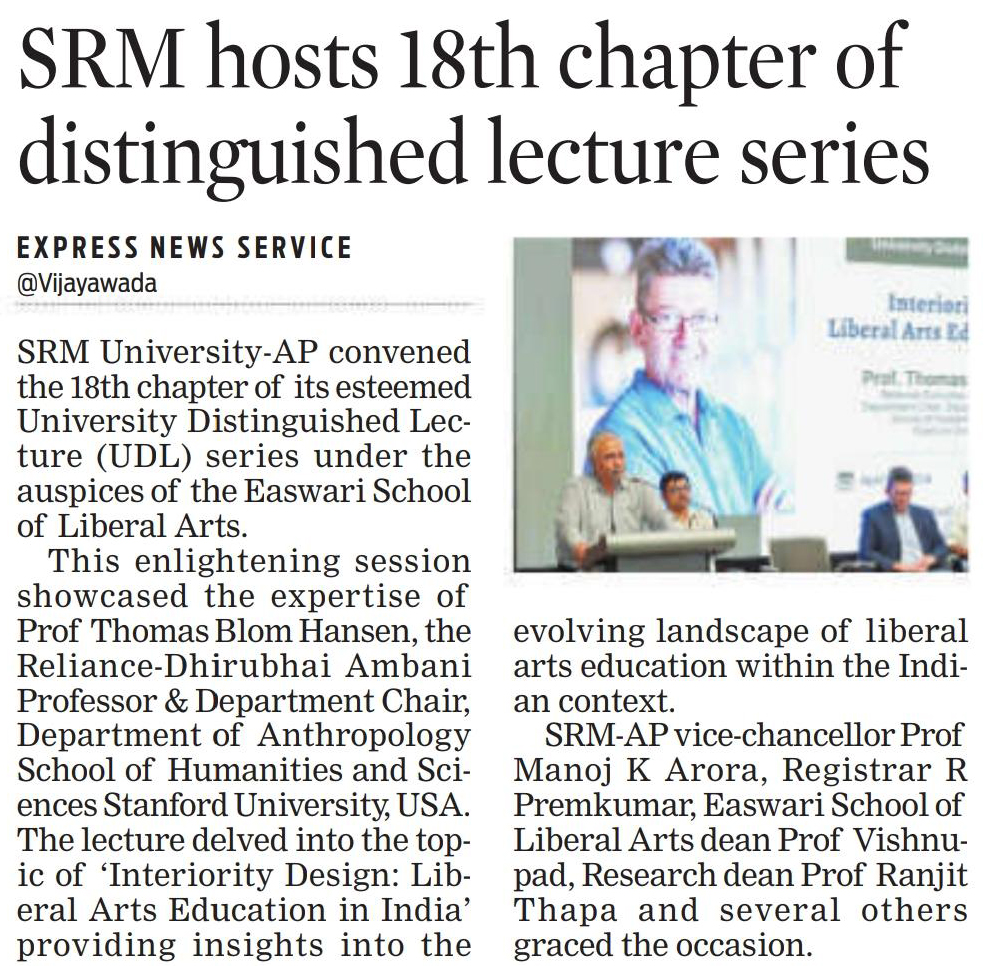
- Reimagining Island Poetics: Seminal Research on N S Madhavan’s Novel April 12, 2024
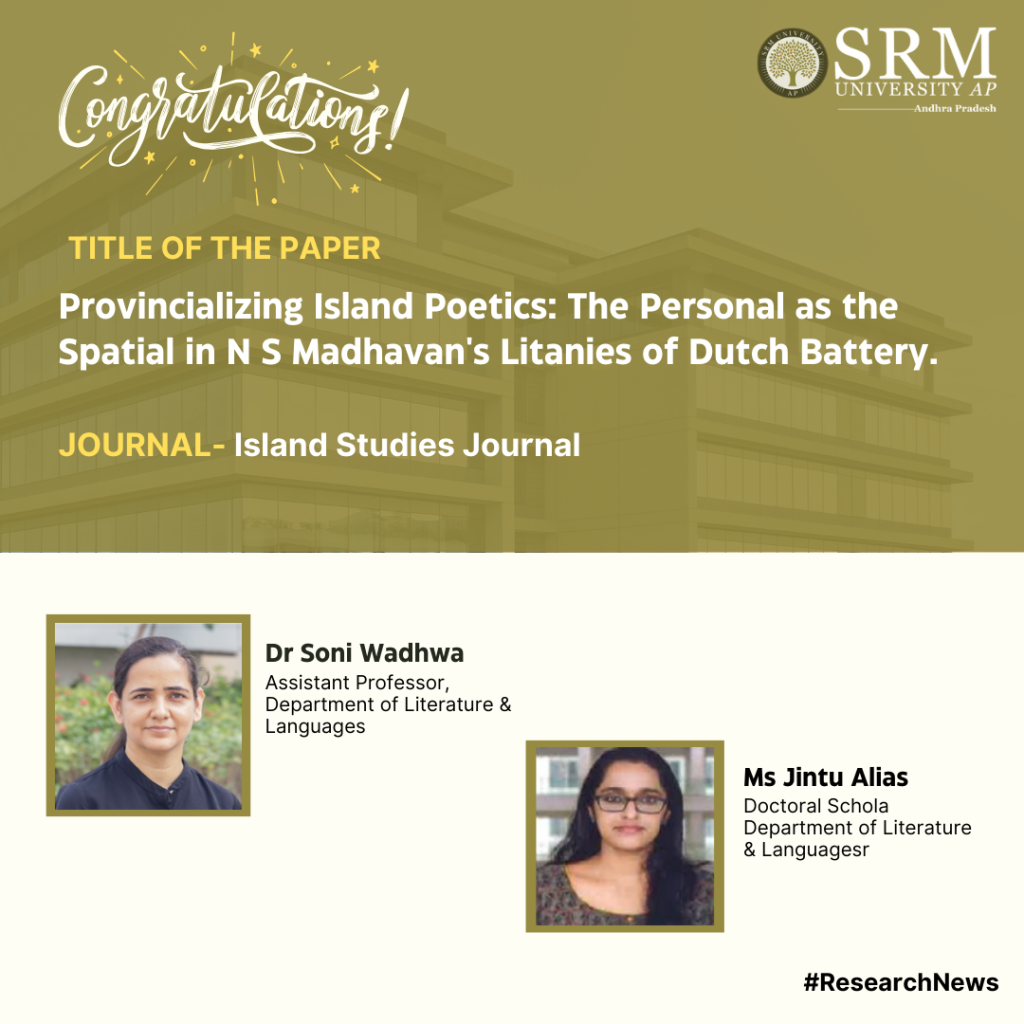
Dr Soni Wadhwa, Assistant Professor at the Department of Literature and Languages and her research scholar, Ms Jintu Alias, from the Easwari School of Liberal Arts at SRM University-AP, have published their seminal research paper titled “Provincialising Island Poetics: The Personal as the Spatial in N S Madhavan’s Litanies of Dutch Battery.”
Their research delves into the intricate relationship between personal experiences and spatial representations, challenging traditional island narratives. Focusing on the island city of Kochi and its rich history of cosmopolitanism, they aim to draw attention to alternative island spaces in India and Asia. Furthermore, they are convinced that their work will inspire further studies and creative writing on cultural traditions in smaller Indian island cities, highlighting the diverse themes and settings that are yet to be explored in Indian literature.Abstract
Affect towards islands is a unique approach to engage with in discussions of the phenomenology of fictional islands. This affect complements the already identified tropes within island poetics: those of sensorial exploration, spatial practices, and textural detailing of islands. This article turns to a work of fiction about a fictional island based on the island city of Kochi in south India to unpack an alternative aesthetic of spatiality, the kind that changes the personal/political relationship to personal/spatial one. We argue that the novel, Litanies of Dutch Battery (the novel in question) by N.S. Madhavan, expands inquiries into phenomenology of fictional islands by making space for corporeal memory and collective memory in storytelling. These memory-oriented narrative devices, we suggest, “provincialize” island poetics to add a hermeneutic of postcolonial angst to the repertoire of formal features of literary islandness.
Link to the Article
https://doi.org/10.24043/001c.94614
We wish the pair continued success in their future endeavours!
Continue reading → - Decoding BSc Mathematics with Subjects That Shape Your Career April 10, 2024
BSc Mathematics is a comprehensive programme that offers a deep dive into various subject areas, shaping students’ understanding and expertise in the field of mathematics. Each subject plays a crucial role in developing analytical thinking and problem-solving skills, from foundational topics like calculus, algebra, and geometry to advanced areas such as differential equations, probability theory, and mathematical modelling.
As students progress through the curriculum, they encounter specialised BSc Mathematics subjects like fundamental analysis, complex analysis, and numerical methods, further enhancing their mathematical prowess.
Moreover, elective courses allow students to tailor their education to their interests and career aspirations, whether in pure mathematics, applied mathematics, or another specialised field. By navigating through these subjects, BSc Mathematics students gain a well-rounded education that prepares them for various career paths in academia, research, finance, data analysis, and beyond.
BSc Mathematics Subjects List
The subjects typically included in a BSc Mathematics programme may vary slightly depending on the university or college offering the course. However, some common subjects that are often part of the BSc Mathematics curriculum include:
- Calculus
- Algebra
- Geometry
- Differential Equations
- Probability Theory
- Statistics
- Real Analysis
- Complex Analysis
- Linear Algebra
- Number Theory
- Discrete Mathematics
- Numerical Methods
- Mathematical Modelling
- Operations Research
- Mathematical Physics
These subjects provide a comprehensive understanding of various mathematical concepts and their applications in different fields.
Year-wise BSc Mathematics Syllabus:
BSc Mathematics syllabus 1st year
Semester 1:
- Art of Listening, Speaking and Reading Skills
- Environmental Science
- Analytical Reasoning and Aptitude Skills
- Chemical Basis of Life
- Mathematics for the Physical World
- Fundamentals of Computing
- Emerging Technologies
Semester 2:
- Effective Writing and Presentation Skills
- Universal Human Values and Ethics
- Entrepreneurial Mindset
- Principles of management
- Psychology for Everyday Living
- Real Analysis
- Linear algebra
BSc Mathematics syllabus 2nd year
Semester-3
- Problem-Solving Skills
- Co-Curricular Activities
- Community Service and Social Responsibility
- Digital literacy
- Discrete Mathematics and Combinatorics
- Real Analysis -2
- Ordinary Differential Equation -1
- Algebra – 1 (Group Theory)
Semester-4
- Creativity and Critical thinking Skills
- Co-Curricular Activities
- Community Service and Social Responsibility
- Mathematical Modelling of Physical Data
- Complex Analysis
- Probability and Statistics
- General Topology
BSc Mathematics syllabus 3rd year
Semester-5
- Co-Curricular Activities
- Community Service and Social Responsibility
- Linear Programming Problem
- Real Analysis – 3
- Partial Differential Equations-1
- Numerical Analysis
- Number Theory and Introduction to Cryptography
Semester-6
- Co-Curricular Activities
- Community Service and Social Responsibility
- MATLAB, Sage and Mathematical
- Measure Theory (For Pure and Applied Math)/ Data Structures and Algorithms (For Data Science and Industrial Mathematics)
- Algebra-2 (For Pure Math/ Mechanics and Tensor Calculus (For Applied Math/ Applied Statistics (For Data Science and Industrial Mathematics)
BSc Mathematics syllabus 4th year
Semester-7
- Algebra -3 (Galois Theory) (for Pure Math)/ PDE – 2 (For Applied Math)/ Regression analysis (for Data Science and Industrial Mathematics)
- Operator Theory (For Pure Math)/ Dynamical Systems (For Applied Math)/ Stochastic process and Stochastic Differential Equations (For Data Science and Industrial Mathematics)
Semester-8
Internships and Research Projects
Jobs After BSc Mathematics
After completing a BSc Mathematics degree, graduates have a wide range of career opportunities available to them across various industries. Some common career paths for BSc Mathematics graduates include:
● Data Analyst
● Actuary
● Statistician
● Financial Analyst
● Operations Research Analyst
● Software Developer
● Market Research Analyst
● Teacher or Lecturer
● Risk Analyst
● CryptographerThese are just a few examples of the diverse career paths available to BSc Mathematics graduates. The analytical, problem-solving, and critical thinking skills acquired during their studies make them valuable assets in a wide range of industries.
Shape Your Tomorrow with Numbers with B.Sc. Mathematics (Hons.) at SRM University-AP
The School of Engineering and Sciences at SRM University-AP offers B.Sc. Mathematics (Hons.) is a four-year undergraduate mathematics programme. Upon B.Sc. completion, students can seamlessly pursue PhDs domestically and internationally. The curriculum features robust foundational math courses alongside minors and open electives. From the sixth semester, students can specialise in three fields:
- Pure Mathematics,
- Applied Mathematics, and
- Data Science and Industrial Mathematics.
B.Sc. Mathematics (Hons.) Programme Highlights:
A diverse range of electives encompassing four advanced discipline-specific options. An undergraduate thesis project aimed at enhancing students’ mathematical abilities and facilitating admission to prestigious graduate programmes in the US and Europe.
Dedicated faculty provide personalised guidance and supervision for each undergraduate thesis.
The meticulously crafted curriculum instils confidence in students to excel in national and international-level mathematics competitive exams such as GRE, CSIR NET, NBHM, GATE, JAM, TIFR, ISI, CMI, etc.
Students specialising in Data Science and Industrial Mathematics will receive comprehensive industry-oriented training.Long Story Short:
Mathematics continues to be a fundamental discipline with widespread applications across various industries and sectors. With the increasing demand for skilled professionals adept in mathematical concepts and techniques, pursuing a B.Sc. Mathematics (Hons.) degree opens doors to numerous rewarding career opportunities.
SRM University-AP offers a comprehensive programme that equips students with the knowledge and skills necessary to excel in this dynamic field. Join it in shaping the future of mathematics and embark on a fulfilling academic journey that will prepare you for success in the ever-evolving world of mathematics and beyond. Take the first step towards a promising career by enrolling in B.Sc. Mathematics (Hons.) at SRM University-AP today!
Continue reading → - Inauguration of NMR Spectrometer Marks a Milestone in SRM University-AP’s Research Capabilities April 10, 2024
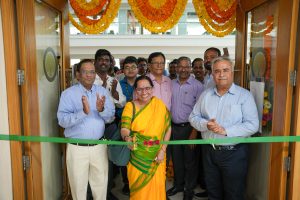 In a significant leap forward for scientific research, SRM University-AP proudly inaugurated the 400 MHz NMR (Nuclear Magnetic Resonance) Spectrometer, procured through the DST-FIST program. This acquisition is a vital component of the broader DST FIST project, which has been awarded to the Department of Chemistry at SRM University- AP with a budget of 2.20 crores.
In a significant leap forward for scientific research, SRM University-AP proudly inaugurated the 400 MHz NMR (Nuclear Magnetic Resonance) Spectrometer, procured through the DST-FIST program. This acquisition is a vital component of the broader DST FIST project, which has been awarded to the Department of Chemistry at SRM University- AP with a budget of 2.20 crores.As part of the project, the Department of Chemistry was recommended a 400 MHz NMR spectrometer by DST, which will play a crucial role in enhancing our expertise and aiding in achieving the proposed objectives. This state-of-the-art equipment is capable of characterising organic, inorganic, and biomolecules, enabling us to conduct comprehensive analyses and advance our understanding of complex chemical systems.
The ceremony, graced by esteemed guests, university dignitaries, faculties, and students, heralded a new era of scientific exploration and innovation. Prof. Lakshmi Kantam Mannepalli, Dr B P Godrej Distinguished Professor, ICT Mumbai, Chief Guest at the event, expressed, ” The inauguration of the 400 MHz NMR Spectrometer heralds a new era of precision and insight in scientific exploration. This instrument will unravel the mysteries of molecular structures and catalyse groundbreaking discoveries in the realm of chemistry and beyond.”
Dr S Mannathan, Associate Professor, Department of Chemistry, extended a warm welcome to the esteemed gathering and offered an insightful demonstration of the equipment’s operation, highlighting its advanced features and functionalities.
Prof. Manoj K Arora, Vice Chancellor, conveyed heartfelt congratulations to the team for this remarkable accomplishment, emphasising the transformative impact the new NMR Spectrometer will have on research and academic pursuits within the Department of Chemistry and beyond.”
Prof D Narayana Rao, Executive Director – Research, SRM Group of Institutions, emphasised, “The addition of this advanced equipment will significantly enhance the research capabilities, opening new avenues for exploration and discovery.”
V S Rao, Advisor, lauded the team for their achievement, stating, “This state-of-the-art equipment embodies our commitment to providing cutting-edge resources for our researchers and fostering a culture of innovation and discovery.”
Dr Pardha Saradhi Maram, Head of the Department of Chemistry, expressed his gratitude to all present and extended heartfelt thanks for their support and encouragement.
The acquisition of the 400 MHz NMR Spectrometer represents a significant advancement in scientific instrumentation, enabling researchers to delve deeper into molecular structures, chemical compositions, and dynamic processes. The Equipment will not only benefit the Department of Chemistry and Physics but also serve as a valuable resource for faculties and students across various disciplines.
The university has already trained 70 to 80 individuals in the operation of this equipment and is planning to organise a workshop for students and faculties from different universities, offering them the opportunity to leverage this advanced technology for their research and academic pursuits.
Continue reading → - Stanford University Professor Highlights Liberal Arts Education in India April 10, 2024
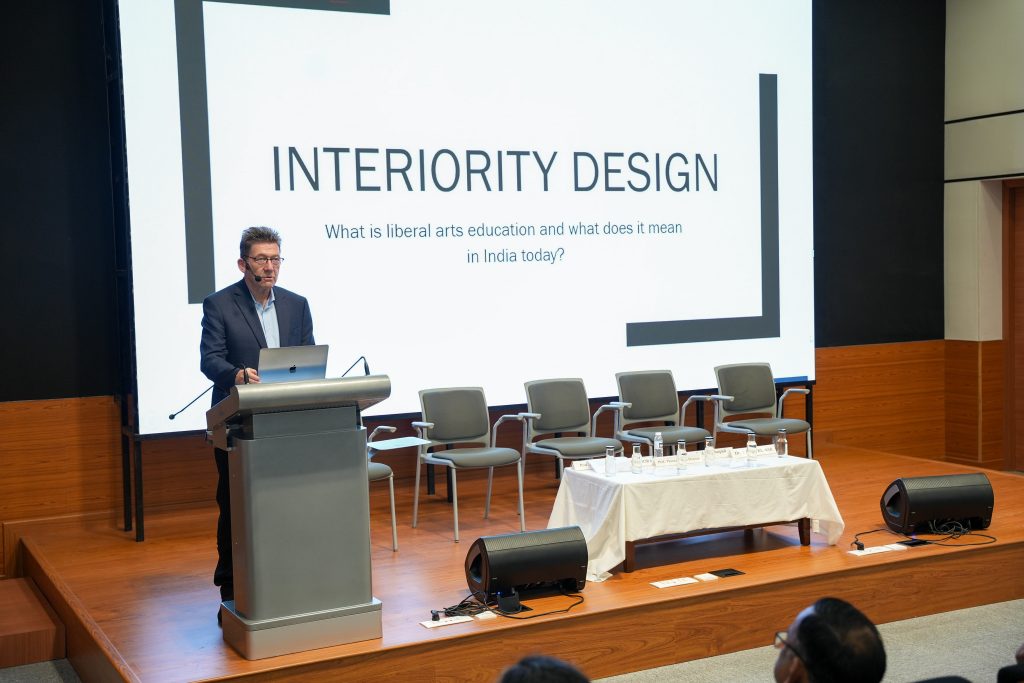
SRM University-AP convened the 18th chapter of its esteemed University Distinguished Lecture (UDL) series under the auspices of the Easwari School of Liberal Arts. This enlightening session showcased the expertise of Prof. Thomas Blom Hansen, the Reliance-Dhirubhai Ambani Professor & Department Chair, Department of Anthropology School of Humanities and Sciences Stanford University, USA. The lecture delved into the topic of “Interiority Design: Liberal Arts Education in India,” providing insights into the evolving landscape of liberal arts education within the Indian context.
Manoj K Arora stated, “We are a university that provides unique learning experiences; this UDL is part of that learning.” His insightful address underscored the significance of liberal arts and interdisciplinary learning.
During the lecture, Prof. Thomas Blom Hansen remarked on the need for liberal arts education in India to shape well-rounded individuals capable of addressing multifaceted challenges and embracing diverse perspectives. Prof. Hansen’s remarks emphasised the relevance and transformative potential of liberal arts education, enabling students to introspect and cultivate a deeper understanding of the world around them.
The 18th chapter of the University Distinguished Lecture (UDL) concluded with an interactive Q&A session. A token of appreciation was presented to Thomas Blom Hansen by Prof. Vishnupad, Dean-Easwari School of Liberal Arts, along with Prof. Ranjit Thapa, Dean-Research; Prof. G S Vinod Kumar, Professor and Head, Department of Mechanical Engineering; Dr Ayesha Parveen Haroon, Head and Assistant Professor, Department of Psychology; Dr J P Raja Pandiyan, Assistant Professor-Department of Chemistry. The event also saw the presence of Registrar Dr R Premkumar, Prof. Jayaseelan Murugaiyan and Prof. Vandana Swami, among others.
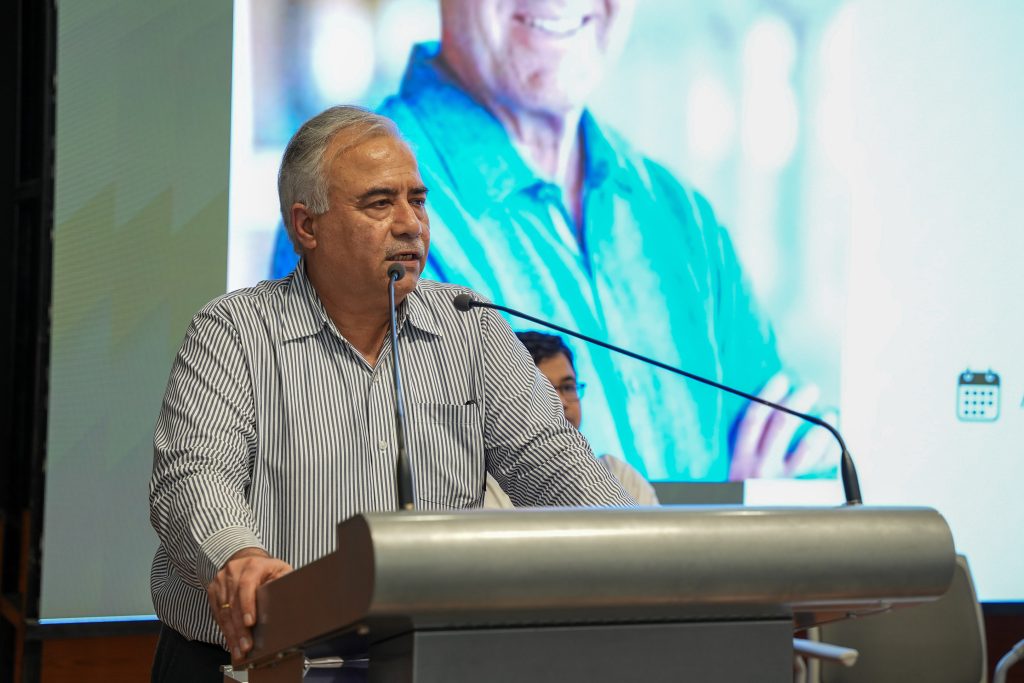
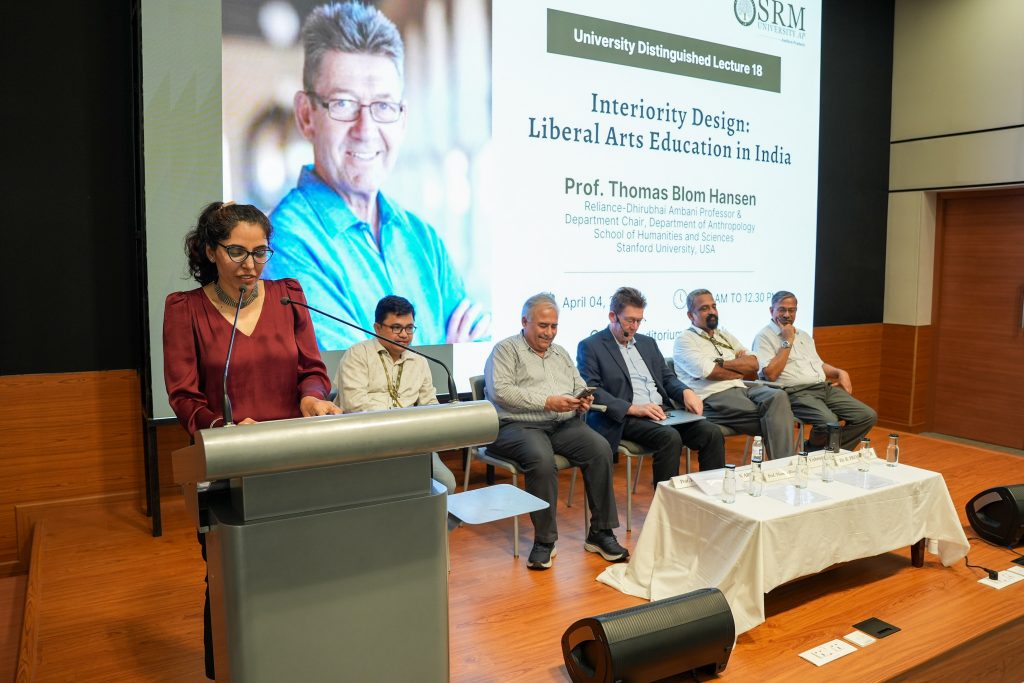
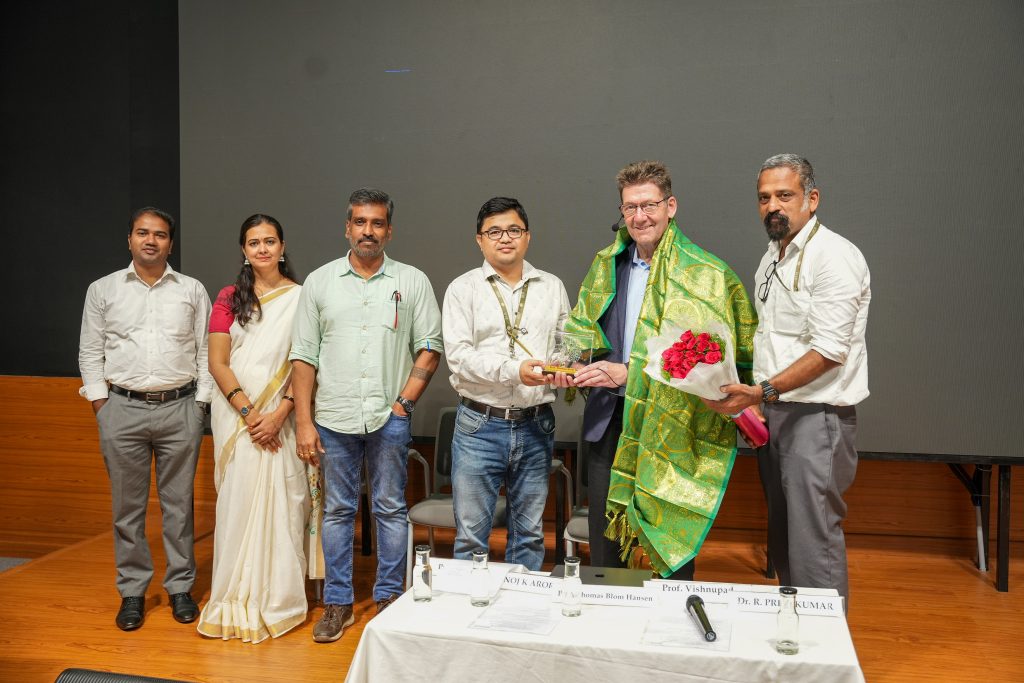
Continue reading →


